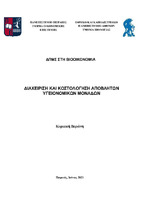Διαχείριση και κοστολόγηση αποβλήτων υγειονομικών μονάδων
Management and costing of waste by health units

View/
Keywords
Υγειονομικές μονάδες ; Επικίνδυνα ιατρικά απόβλητα ; Μέθοδοι διαχείρισης ιατρικών αποβλήτων ; Κόστος διαχείρισης ΕΑΥΜ ; Νομοθετικό πλαίσιοAbstract
The object of this dissertation is the work of collection, transportation, final management and disposal of hazardous medical waste coming from the Health Units, as well as their costing. In the first part of this dissertation, a reference is made to waste management items and practices that come from the health units. Hazardous waste is generated during the operation of the health units, which need immediate and safe management. The necessity stems from the fact that mishandling of this waste can cause serious problems for both public health and the environment. To ensure the proper process of collection, transport and management of hazardous medical waste, the relevant global and national health and environmental organizations have adopted the necessary legislation and directives. In the context of Sustainable Development and Circular Economy, a key parameter in the process that starts from the production of waste, until its final disposal, is the selection of the best economic solution and the minimization of the resulting costs. Each generated waste is characterized by its type and properties. Therefore, depending on the characteristics of the waste, there are appropriate practices for its management. In the second part of this work, it is presented the result of the personal research, which was conducted in a public hospital, two private clinics and a number of private clinics, in order to reflect the current situation, the needs that exist and the formulation of the optimization proposals. According to the results of the research, it is concluded that in large health facilities, the staff is better trained, compared to the private doctors. This happens because the protocols followed in large health facilities are stricter and there is specialized department, whose job is exclusively to manage the medical waste generated. This situation could be changed, through the continuous improvement and training of the staff of all the health units, the active support and activation of both the professionals themselves and the state. Finally, the above-mentioned actions should not only focus on the techno-economic benefits of the safe management of Hazardous Medical Waste, but also aim at the environmental awareness with the adoption of the “Zero Waste” philosophy.

